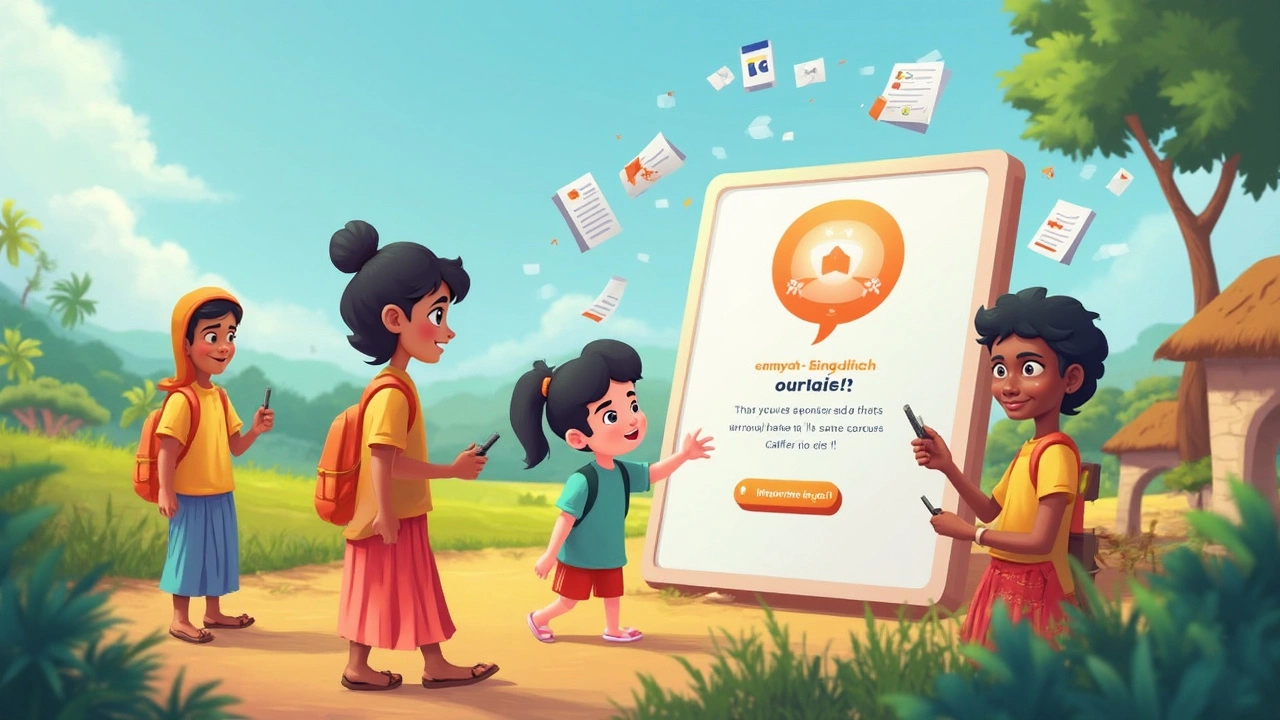So, you've decided to learn English, and you're considering using an app to dive into the language. Good choice! Apps are super handy because they allow you to learn on the go, fitting practice into your busy schedule. Plus, they're usually a lot more fun than flipping through a dusty old textbook.
With tons of options out there, though, picking the right app can be a bit overwhelming (and a little confusing, to be honest). But that's where we come in. We've sifted through the masses to spotlight some of the best English learning apps that really make a difference, whether you're just starting or you're trying to nail that perfect accent.
Before downloading just any app, keep in mind a few things that can make or break your learning experience. You'll want something that boosts your speaking, listening, and even lets you play around with grammar in a way that's actually enjoyable. Imagine being able to chat with native speakers or watch clips in English and actually understand them—exciting, right?
- Why Choose an App to Learn English?
- Top Apps for Beginners
- Best Apps for Advanced Learners
- Features to Look For
- Tips for Getting the Most Out of Language Apps
Why Choose an App to Learn English?
So, why should you lean into apps for learning English instead of traditional methods? Well, for starters, apps are flexible and accessible wherever you are. Got a smartphone or tablet? Then you've got a portable classroom. No need to lug around heavy textbooks or rely on specific class times.
Apps often bring in elements of fun and play, which can make learning a breeze rather than a chore. They gamify the process with points, levels, and rewards, turning a mundane task into a daily challenge. We all love a little competition, right?
Another big plus is personalization. Most apps tailor lessons to your pace and style. If you're breezing through vocabulary, an app might throw more challenging words at you. Struggling with grammar? The app can offer more practice exercises. It’s like having a personal tutor in your pocket.
Want to track your progress? Many apps offer this feature, so you can see just how far you've come, which is pretty motivating. Plus, they often have features like speech recognition for improving pronunciation. Practicing real-life conversations without the awkwardness can seriously boost your confidence.
And let's not forget cost. While traditional courses can cost an arm and a leg, many apps offer a free version or are significantly cheaper than physical classes. You can get quality lessons without breaking the bank.
In short, English learning apps provide an engaging, flexible, and cost-effective way to improve your language skills. They mold to your needs and lifestyle, which is not just convenient but a game-changer for anyone serious about picking up English.
Top Apps for Beginners
Starting your English learning journey can be tough, but don't sweat it. Thanks to technology, there's a bunch of English learning apps that make it easier and more fun. If you're a beginner, you’ll want something that’s simple yet engaging. Here are a few top picks that have gained popularity for their beginner-friendly setups.
First up, there's Duolingo. It’s like the colorful, playful app that's perfect for getting the basics down. Duolingo gamifies language learning, making it feel more like a game than a study session. According to Luis von Ahn, co-founder of Duolingo,
"The app's mission is to make education free and accessible to everyone."This philosophy makes it a hit among new learners.
Another app worth checking out is Babbel. While it does come with a subscription fee, it offers courses created by language experts, making sure you learn stuff you'll actually use. Babbel covers practical topics like ordering food or making small talk, which are super handy when you're traveling or meeting new people.
For those who prefer video lessons, Busuu is a great option. It not only provides well-structured lessons but also connects you with native speakers. This feature means you can practice what you’ve learned directly with people who speak the language, giving your learning a real-world twist.
- Duolingo: Best for gamified learning
- Babbel: Best for practical conversation skills
- Busuu: Excellent for interaction with native speakers
Before jumping in, try out a free session in each of these apps to see which suits your vibe and learning style the best. Remember, consistency is key, so find the one that makes you want to come back every day. Happy learning!

Best Apps for Advanced Learners
If you've already got the basics down and you're looking to kick things up a notch, you're in exactly the right place. Here, we'll look at apps that can take your English skills from the ‘good enough’ level to downright impressive. Whether you're prepping for a big presentation or just want your streaming game to be as smooth as possible, there’s an app for that.
Rosetta Stone is often a top pick. It's renowned for its immersive approach, pushing you through scenarios where English is all around, mimicking how you'd learn naturally. This setup is a real game changer if you're aiming to think in English rather than constantly translating in your head.
Then there's Babbel. Known for its focus on real-world conversations, Babbel does a great job at nailing down practical vocabulary and phrases. It's especially handy if you're planning to travel or work in an English-speaking setting and need to sound more fluent and relatable.
Lingoda is another solid choice for those ready to interact with actual teachers. Offering small group classes and even private sessions with native speakers, it’s an excellent resource to get genuine feedback and refine those subtle nuances in your language.
- Speechling: For those who want to perfect their accent, this app matches your speech against native examples, helping with pronunciation—a crucial skill if you want to be understood clearly.
- italki: Connects you with professional teachers or casual conversation partners to suit whatever level of engagement you're after. It’s customizable and can adapt to your specific goals.
If you’re a numbers person, a quick look at a recent survey shows that about 40% of users find that these apps improve their confidence significantly. That’s something to keep in mind when deciding where to invest your time and effort.
Stick with any of these apps consistently, and you'll find that your English won’t just be advanced—it’ll be polished, natural, and ready for whatever challenge you throw its way.
Features to Look For
When you're out hunting for the best English learning apps, there's a ton of cool stuff you need to keep an eye on. Not all apps are created equal, so let's break down what makes an app worth your time.
First up, interactive lessons. You want something that doesn't just throw words at you but lets you actively engage. Whether it's through games or quizzes, interaction helps your brain soak up information better.
Another biggie is speech recognition. It's like having a mini language coach in your pocket. This feature lets you practice pronunciation and really get those sounds right without feeling awkward. Apps with speech recognition often rank higher among language learning tools because they provide feedback you can't get from a book.
Next, look for apps with a good balance of all language skills. That means they should cover reading, writing, listening, and speaking. Think of it like a workout; you want to hit all muscle groups!
A lot of awesome apps have community features too. This means you can chat with native speakers or other learners. It's a fun way to improve your conversational skills and peek into different cultures.
- Vocabulary building tools: Apps that offer flashcards or spaced repetition systems help lock in new words.
- Progress tracking: Seeing your improvement over time can be super motivating. Some apps even send you reminders to keep up your streak!
- Offline access: Perfect for learning on the go, especially if you're in places without Wi-Fi.
Finally, pay attention to user reviews. Past users can give you a heads up on any glitches or features that stand out. While you're at it, check out any free trials before committing, so you know if it's the right fit for your English courses. With these features, you'll be well on your way to learning English in a way that's effective and, dare I say, enjoyable.

Tips for Getting the Most Out of Language Apps
Alright, so you've got some English learning apps installed and you're ready to get cracking. Awesome! But hang on, just downloading them isn't going to turn you into an English whiz overnight. Let's talk strategy.
First off, create a routine. Just like any habit, make learning English part of your daily life. Whether it's during your morning coffee or right before hitting the sack, consistency makes all the difference. Even if it's just 10-15 minutes a day, it'll add up big time.
Next, don't just stick to one skill. Some folks dive into just speaking or only listening, but mix it up! Apps usually offer a combo of speaking, listening, reading, and writing exercises. Use them all to get a well-rounded boost.
Try setting small, achievable goals. Maybe you want to learn 10 new vocabulary words a week or finally understand that tricky grammar rule. Put those goals on paper (or your app's notes section), and you’ll feel super accomplished ticking them off.
Here's a cool tip: if your app offers any kind of interaction with native speakers, jump on it. Chat with them, ask questions, and even if you make mistakes, it's all part of the learning curve. Plus, it helps you pick up the natural flow of the language.
| Task | Average Time Per Day |
|---|---|
| Vocabulary Practice | 10 minutes |
| Listening Exercises | 15 minutes |
| Conversational Practice | 20 minutes |
Finally, don't forget to have fun with it. If you're not enjoying the process, you're less likely to stick with it. Find an app that, aside from being functional, also has engaging content—like pop culture references or funny stories. You might even forget you're studying!
